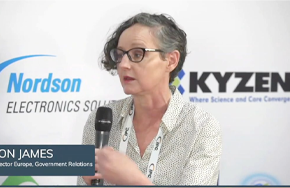|
Dear IPC Members:
Our advocacy work in 2022 is just beginning, and IPC is making our industry’s voice heard on multiple issues from chips subsidies to toxic substances. Read on below and get ready for several opportunities to make your voice heard in the weeks ahead.
This weekly newsletter is a snapshot of the top issues we’re working on for you all over the world, designed to be scanned in under five minutes. Please let us know if you have any questions or suggestions about our advocacy work.
All the best,
Chris Mitchell
Vice President, Global Government Relations
The Headlines at a Glance:
TOP NEWS OF THE WEEK
- IPC Among Groups Urging Congress to Fund CHIPS Act
QUOTE OF THE WEEK
- Joe O'Neil of OAA Ventures
IPC ADVOCACY & YOU
- Which Government Policies Worry You Most?
ENVIRONMENT AND HEALTH
- What Are the Best Practices for Eco-Design?
- Fresh Opportunity to Engage with EPA on TSCA
- Lead Considered for Inclusion on REACH Authorization List
- REACH Regulation Under Revision
EUROPEAN UNION
- IPC Welcomes the European Chips Act
TRADE AND SUPLY CHAIN
- U.S. Government Seeks Comment on Chinese Import Restrictions
- High Material and Labor Cost Challenges Remai
HELP US SPREAD THE WORD ON SOCIAL MEDIA
KEEP IN TOUCH WITH US
TOP NEWS OF THE WEEK
IPC Among Groups Urging Congress to Fund CHIPS Act: IPC this week was among a multi-association group urging Congressional leaders to reach consensus on R&D and competitiveness legislation, including funding for CHIPS Act investments. IPC supports the CHIPS Act, which passed the U.S. Senate in June and the U.S. House earlier this month. But chips do not function on their own. IPC urges the U.S. Congress to combine its investments in semiconductor manufacturing with additional support for advanced packaging, printed circuit boards (PCBs), and related technologies. IPC Contact: Chris Mitchell.
QUOTE OF THE WEEK
“The PCB fabrication sector in the United States is in worse trouble than the semiconductor sector, and it’s time for both industry and government to make some significant changes to address that.”
– Joe O'Neil of OAA Ventures and member of the IPC Thought Leaders Program, comments on his report, “Leadership Lost? Rebuilding the U.S. Electronics Supply Chain, available now.
IPC ADVOCACY AND YOU
Which Government Policies Worry You Most? As we plan our GR activities for the year, we want to know how the IPC Government Relations team can best advocate for you now and in the future. Cory Steeby of Holland, Michigan recently advised us that “tariffs are an ongoing additional tax on U.S. manufacturing companies,” and “the electronic component and bare PCB supply chains are broken.” Let us know your top concerns via this five-minute, five-question survey. IPC Contact: Chris Mitchell.
ENVIRONMENT & HEALTH
What Are the Best Practices for Eco-Design? The International Electronics Manufacturing Initiative (iNEMI) and IPC recently held a joint webinar series covering the best and most innovative eco-design practices being used in our industry today. View our video series on some of the common themes and lessons learned here. IPC Contact: Kelly Scanlon.
Fresh Opportunity to Engage with EPA on TSCA: The U.S. Environmental Protection Agency has reopened the dockets for the 20 high-priority substances to undergo risk evaluation under the Toxic Substances Control Act (TSCA). This provides an additional opportunity for the public to submit information that would help inform the risk evaluation processes for these chemicals. The dockets are open until June 9. Please let us know if you are interested in this opportunity to provide information to the EPA. IPC Contact: Kelly Scanlon.
Lead Included on Draft REACH Authorization List: Lead (Pb) metal is one of eight substances included on the latest draft Registration, Evaluation, Authorization and Restriction of Chemicals (REACH) Authorization List. A three-month public consultation by the European Chemicals Agency (ECHA) began on February 2 and included requests for information on the ECHA’s draft recommendation and the potential socio-economic consequences, respectively. IPC will continue to coordinate with industry stakeholders on communication regarding this regulatory activity. Let us know if you would like to learn more. IPC Contact: Kelly Scanlon.
REACH Regulation Under Revision: The European Commission is currently accepting input on broad revisions to the Registration, Evaluation, Authorization, and Restriction of Chemicals (REACH) Regulation to better reflect the ambitions set forth in the Chemicals Strategy for Sustainability. The consultation period is open through April 15. If your company is interested in participating in the consultation, please let us know. IPC Contact: Kelly Scanlon.
EUROPEAN UNION
IPC Welcomes the European Chips Act: The European Commission adopted a proposal last week aimed at improving the bloc’s semiconductor and microchip production. The electronics manufacturing industry welcomes the release of the European Chips Act, with its strong support for advanced packaging, and is calling for its swift adoption and implementation as part of a broader strategy to rebuild the European electronics manufacturing ecosystem. The plan now requires approval from the European Parliament and EU Member States. IPC Contact: Alison James.
TRADE AND SUPPLY CHAIN
U.S. Government Seeks Comment on Chinese Import Restrictions: The U.S. Department of Homeland Security (DHS) recently published a Federal Register Notice seeking public comment on legislation implementing new Chinese import restrictions. The legislation, called the Uyghur Forced Labor Prevention Act (UFLPA), restricts the importation of Chinese goods that are produced in the Xinjiang Uyghur Autonomous Region (Xinjiang) with forced labor. The public comment period has a deadline of March 10, and the new restrictions are set to come into effect on June 21. Let us know if these restrictions would affect your business. IPC Contact: Ken Schramko.
High Material and Labor Cost Challenges Remain: According to the latest data from IPC, supply chain challenges remain acute, but they may have peaked, while lead times remain high. IPC’s February Monthly Economic Update and Global Sentiment Survey reports found that high material and labor costs are expected to continue for at least six months, while recruiting and finding skilled talent continues to be difficult. Let us know if you have any questions. IPC Contact: Shawn DuBravac.
HELP US SPREAD THE WORD ON SOCIAL MEDIA
 |
|
 |
“Europe is not looking to build industries that are not sustainable and do not meet the climate objective.” Alison James, senior director, IPC Europe government relations, provides Global SMT & Packaging with an update on IPC’s work in Europe regarding the green deal, digitization, sustainable supply chains, and upcoming legislation affecting the global electronics manufacturing industry. |
“Sustainability needs to be embedded into the design.” Matt Kelly, IPC’s chief technologist, covers digital transformation, additive manufacturing, supply chain issues, and sustainability in a wide-ranging interview with Trevor Galbraith at Global SMT & Packaging. |
KEEP IN TOUCH WITH US
Meet the IPC GR Team: Whether it’s engaging with policymakers in Washington, D.C., in the European Union or in China, the IPC Government Relations (GR) Team proactively seeks opportunities to educate, inform and influence policymakers on policies that spur innovation, growth and competition, while protecting human health and the environment. But our success depends on your support and engagement. Learn more and get involved in IPC advocacy today! IPC Contact: Chris Mitchell.
Subscribe to IPC Global Advocacy Report: If you’re a member of IPC, manage your e-mail preferences and opt in to receive “Advocacy” updates. If you are not an IPC member — or you’re not sure — please send a note to friends@ipc.org, and our staff will add you to the list.
Follow us on Twitter and LinkedIn.
Contact one of us if you have any questions or insights to contribute.
Tell us how government policies affect your business.
See prior editions of Global Advocacy Report.
Explore our IPC Government Relations information online.
|
